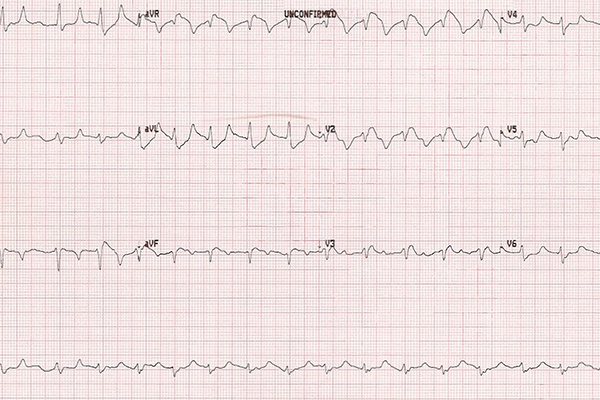

Therapy for hyperkalemia due to potassium retention is ultimately aimed at inducing potassium loss 1-3. This usually requires a potassium level of 6.5 or greater and frequently appears as in "intraventricular conduction delay" or IVCD, which is characterized by a widened QRS complex of > 120 ms that does not meet the criteria for a left or right bundle branch block. INTRODUCTION Hyperkalemia is a common clinical problem that is most often due to impaired urinary potassium excretion due to acute or chronic kidney disease and/or disorders or drugs that inhibit the renin-angiotensin-aldosterone axis. 13 Treatment of life-threatening hyperkalemia focuses on blocking the effects. Media in category 'SVG ECG graphs of hyperkalemia' The following 2 files are in this category, out of 2 total. Typical ECG findings in hyperkalemia progress from tall, peaked T waves and a shortened QT interval to lengthening PR interval and loss of P waves, and then to widening of the QRS complex culminating in a sine wave morphology and death if not treated.
#Hyperkalemia ecg findings wikimedia free
Peaked T waves best seen in the precordial leads, shortened QT interval and, sometimes, ST segment depression. From Wikimedia Commons, the free media repository. An increased likelihood of short-term adverse event was found for hyperkalemic patients whose ECG demonstrated QRS prolongation (relative risk RR 4.74, 95 CI 2.01-11.15), bradycardia (HR<50) (RR 12.29, 95CI 6.69-22.57), and/or junctional rhythm (RR 7.46, 95CI 5.28-11.13). electrocardiographic features of hyperkalemia is another. From earliest to latest, the ECG findings include: objective findings in a specific clinical context pertaining to emergency medicine and critical. It is important to remember that the electrophysiologic effects of hyperkalemia are directly proportional to. The ECG findings of hyperkalemia change as the potassium level increases. Hyperkalemia is an electrolyte abnormality seen in the emergency department as well as in hospitalized patients and it can be associated with adverse clinical outcomes and death if not treated appropriately.


 0 kommentar(er)
0 kommentar(er)
